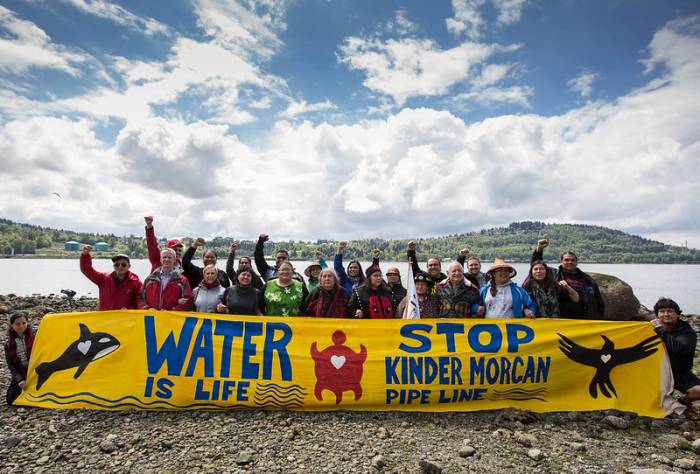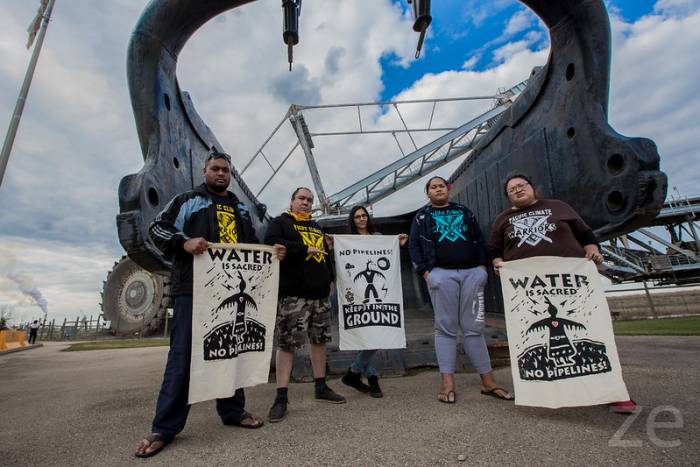Two weeks ago, Justin Trudeau’s government, in what seems to be a campaign tactic to secure a highly contested seat on the UN Security Council, announced $9.5m “support” for climate finance in the Pacific.
Two years ago, the same Trudeau-led government announced that it would nationalize the Kinder Morgan pipeline running from the tar sands of Alberta to the tidewater of British Columbia. It was anticipated to fork over at least $4.5bn in Canadian taxpayers’ money for the right to own a 60-year-old pipe that springs leaks regularly, and for the right to push through a second pipeline on the same route.
Other than a media release from the Fijian Government, not much information has been forthcoming. This sudden bout-turn was an obvious ploy to get votes for the last-minute campaign Trudeau mounted just a week before the meeting with the UN Security Council. Canada was up against Norway and Ireland because they wanted a seat and climate activists, especially Greta Thunberg, stated that Canada has been failing miserably on climate action.
How Much Has Canada Done for Climate Change?
Canada is currently poised to spend well over $12.6B on the TransMountain pipeline – a project that the Canadian government purchased in 2018 after US-based pipeline company Kinder Morgan abandoned its plans to build the pipeline.
Building this project would be in direct conflict with Canada’s commitments under the Paris Climate Agreement, positioning Canada to burn up 16% of the world’s carbon budget to keep temperatures below 1.5 degrees. In 2017, Trudeau refused to meet with a delegation of Pacific Climate Warriors who travelled all the way across the world to urge him not to build this pipeline.

Isn’t the Pacific Climate Finance Grant a Good Thing?
Let’s not get too excited about grants marketed as ‘climate finance for the Pacific’ just yet. Digging a little deeper into what has been divulged about the major new program, the Canadian government’s partnership with the Rocky Mountain Institute will help train 30 climate finance advisors a year and deploy 12 experts to the capitals of some of the most climate-vulnerable nations, notably the Pacific Small Island Developing States (PSIDS), for a one to a two-year assignment.
Through the Climate Finance Access Network (CFAN), Pacific countries will be able to seek funds to develop specialist skills and expertise to work with Governments in accessing climate finance. This Network will deploy highly-trained climate finance advisors dedicated to securing climate financing for priority investments in climate resilience and energy transition.
In essence, this is just another form of neo-colonialism, where Canada still sees the need to ‘send in experts’ to the developing Pacific Islands, to solve the climate crisis which they themselves have and continue to perpetuate. This is no generous move to be celebrated, it’s just a publicity stunt.
What happened at the UN Security Council Meeting?
In the lead up to the meeting, Canada promoted its candidacy for the Security Council by trying to make last-minute commitments towards climate change programs overseas, with a frantic effort, phoning leaders in India, Pakistan, Mexico, North Macedonia, and Fiji, to secure votes.
However, Canada’s rivals for the seats have records showing their per capita greenhouse gas emissions (GHG) are a little more than half of Canada’s. Canada’s GHG emissions rose 15 million tonnes between 2017 and 2018. The Canadian government went on to purchase a climate destabilizing oil sands pipeline. As a result, there’s basically no chance Canada will reach its (insufficient) GHG reduction commitments under the 2015 Paris climate accord.
Canada needs to walk the talk.
Trudeau needs to prove to Pacific Island nations that his government is genuine about addressing climate change and take immediate measures to stop supporting the fossil fuel industry.
The ‘gift’ he should be giving the people of the Pacific, is the opportunity to thrive on a planet that is not being choked by fossil fuel extracting industries.

So far, Trudeau’s track record has been nothing but disappointing. All we have to rely on, are actions Trudeau had taken in the past. In 2017, Trudeau told a room full of oil executives that “no country would find 173bn barrels of oil in the ground and just leave it there.” This statement affirms that Canada is fully committed to expanding extraction in its deadly tar sands and blowing through 1/3rd of the entire world’s carbon budget. That kind of irreversible damage to the climate would condemn the Pacific to deadly climate devastation.
During the 2015 Paris Climate talks, Canada joined forces with the US to oppose calls from Pacific Island Nations and other Global South countries in support of loss and damage mechanisms. Loss and Damage measures would mandate that countries most responsible for climate change financially compensate climate impacted countries for the inevitable destruction of climate change.
If Prime Minister Trudeau truly wants to demonstrate his commitment to supporting climate finance and resilience in Pacific Island nations, he needs to make Canada pay its fair share to compensate climate impacted communities for loss and damage from the climate crisis.
If Trudeau’s sentiments have genuinely changed, it needs to be shown with real actions back home, and not misleading marketing overseas.